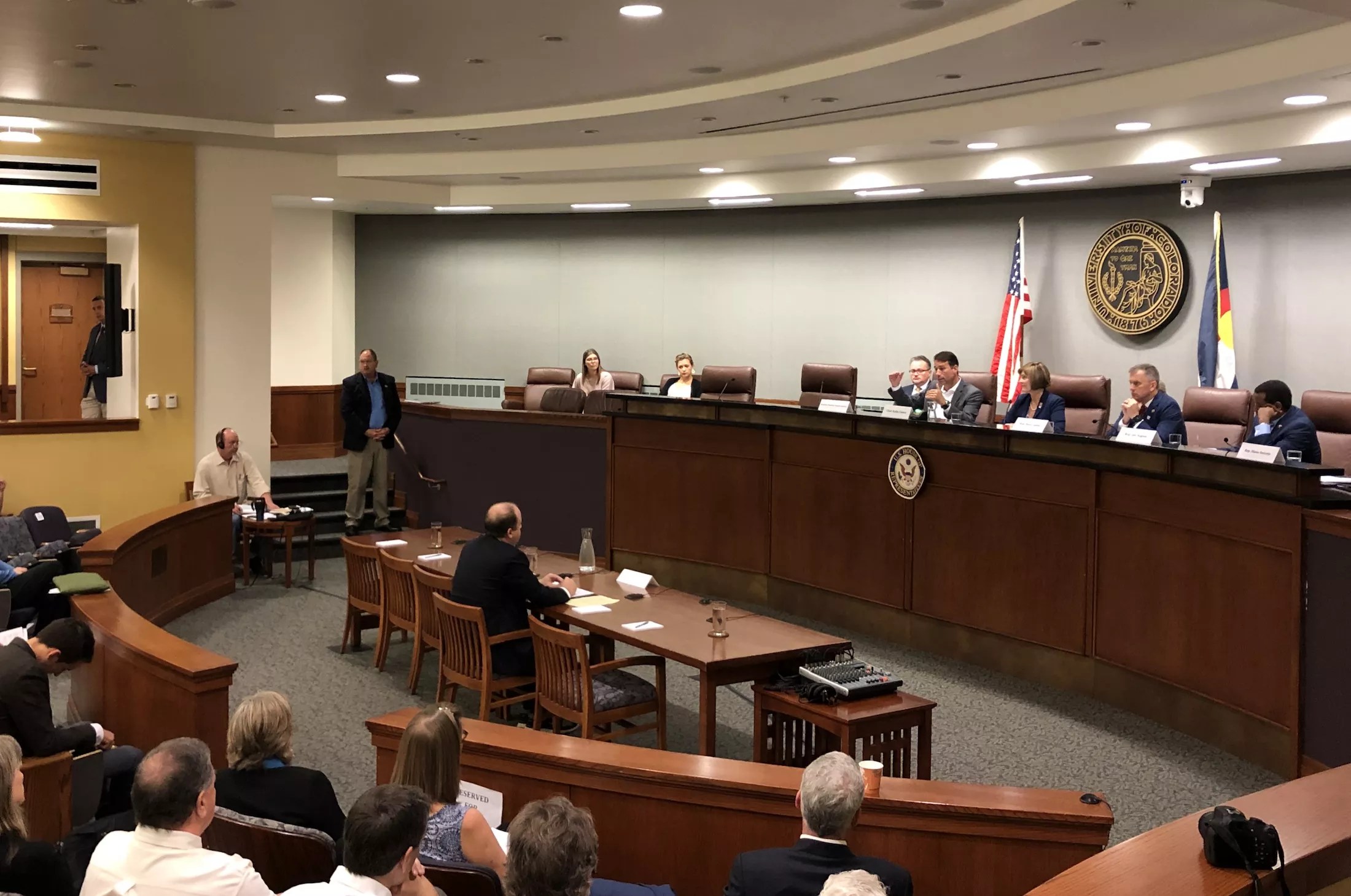
Chase Woodruff

Audio By Carbonatix
A special congressional panel to spearhead a stronger federal response to the climate crisis is looking to policies enacted in Colorado as a potential model for the country.
The House Select Committee on the Climate Crisis held its first field hearing in Boulder today, August 1, inviting state and local leaders from across Colorado to testify about the state’s efforts to reduce climate-altering greenhouse gas emissions. Representative Joe Neguse, a Democrat who represents Boulder in Congress, was among the members selected for the committee when it was established by House Democrats earlier this year.
“I can think of no better place than Boulder, Colorado, and Colorado as a state, to host this first field hearing,” said Neguse. “It’s the epicenter of climate research in the United States.”
In addition to the August 1 hearing, committee members this week toured several climate and energy research laboratories in Neguse’s 2nd Congressional District and elsewhere along the Front Range, including the National Renewable Energy Laboratory and the National Center for Atmospheric Research, and consulted with state and local officials on climate policy.
“As the committee works [on a] national climate action plan, we need to build on what is working in states and communities across this great country,” said committee chair Representative Kathy Castor, a Democrat from Florida, in opening remarks at the August 1 hearing, which was held in the Wittemyer Courtroom at the University of Colorado School of Law.
Governor Jared Polis, who made a plan to achieve a 100 percent renewable electric grid by 2040 a centerpiece of his 2018 campaign, spoke to the committee about Colorado’s efforts to fight climate change, which he called “an existential threat to our security, our health, our economy, our public lands and ecosystems, and our very way of life.”
Under Polis, Colorado has enshrined into law a series of ambitious greenhouse gas emissions goals, including a 50 percent cut by 2030, and enacted a slate of new legislative and regulatory measures to help achieve them. In contrast to sweeping progressive proposals like the Green New Deal and the actions taken by other governments around the world, Colorado’s approach has emphasized private-sector innovation and a market-based transition to clean energy rather than new mandates or substantial increases in public investment.
“We’ve taken significant strides during my first seven months in office to put us on the path to achieving this bold goal,” said Polis. “But the truth is that through price reductions and technological advances, the shift to renewable energy is already happening.”
For some, the shift isn’t happening fast enough. Climate activists rallied outside CU’s Wolf Law Building before the hearing began, urging policymakers at both the state and federal levels to adopt a more aggressive stance. Members of environmental groups like Extinction Rebellion, Food & Water Watch and 350 Colorado demonstrated in support of measures like a national declaration of “climate emergency,” restrictions on new fossil fuel development and a more aggressive timeline for reducing emissions.
“While Colorado is held up by some as an example of Clean Energy Action, reality is substantially different,” read a statement released by Extinction Rebellion Boulder County. “The air quality along Colorado’s Front Range, due to unbridled growth of fracking activity in Weld County and beyond, has contributed to a precipitous decline in air quality throughout the region.”
In addition to Polis, the committee heard from a panel of local elected officials and energy experts that included Boulder Mayor Suzanne Jones, Fort Collins Mayor Wade Troxell and Chris Wright, the CEO of Denver-based Liberty Oilfield Services. Wright, who was the only witness invited by the committee’s Republican members, dismissed the notion that Colorado’s oil and gas industry is responsible for declining air quality along the Front Range.
“Even as Colorado’s oil production has quadrupled, [volatile organic compound] emissions have dropped 40 percent,” Wright said. “This is technology at work.”
Studies have shown that the so-called ozone precursors emitted by oil and gas facilities are among the top local sources of local ozone pollution, but Wright and other industry supporters argue that so-called background ozone, some of which can be traced to air pollution from China, should get more of the blame. Wright’s comments prompted pushback from Neguse.
“I would implore you to read the data, to talk to people in the communities that are being impacted here in Boulder County and elsewhere across the state,” Neguse said. “It is a very real, visceral issue for them.”
The Climate Crisis committee will continue to hold hearings through the end of next year, and is tasked with making recommendations to permanent House committees on potential new legislation to more effectively mitigate and adapt to climate change.
“From my perspective, my role on the committee is to do what I can to make those recommendations as bold as possible,” Neguse told Westword after the hearing. “You have to set ambitious goals. So I think that the committee is going to have to step forward with some ambitious goals around our energy mix.”
Neguse, a co-sponsor of the Green New Deal resolution, spoke to some of the activists before the hearing began, and told them he agrees that action to stop climate change should include restrictions on new fossil-fuel development.
“That is part of the conversation around the transition,” Neguse said. “You get there by doing both, by transitioning off of fossil fuels and by increasing investments in renewables.”
As the hearing wrapped up, Castor emphasized the need for strong federal climate policy to support the work being done in Colorado and other states.
“We can have all this terrific climate action on the local and state level,” Castor said. “But unless we have a bold federal climate action plan, we are not going to be able to reduce carbon pollution. We’re all in this together.”